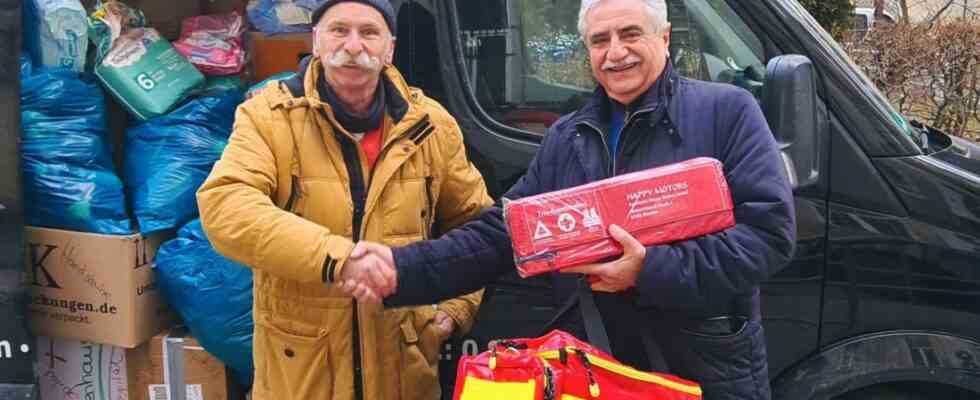Last Wednesday, Udo Schmitt and his son Stefan drove from Brunnthal to Lviv (Lemberg) in the Ukraine in a van full of tools. Spontaneously, to help quickly and specifically. The SZ spoke to the 65-year-old real estate agent, who has been involved with the water rescue service for 45 years and is active in many other aid organizations.
SZ: Mr. Schmitt, how did your action come about?
Udo Schmitt: I know from experience that the administrative work involved in larger aid organizations eats up a lot of time. So I did some research and was able to get in touch with the regional hospital, i.e. the university clinic in Lviv, through the Ukrainian Greek-Catholic Church in Munich. We managed to get the aids we wanted from there cheaply through a pharmacy in Munich-Waldperlach with privately donated money. The local kindergarten “Noah’s Ark” gave us clothes, blankets, shoes, diapers and baby food and the Staudinger Group donated a power generator.
How was the trip?
My friend, the owner of the painting company Fatmir Sallahi from Holzkirchen, lent me a van and said straight away that he would cover all fuel and toll costs. With only two fuel stops we reached Jaroslaw in Poland on Thursday night. Too late to get to Lemberg. We stayed the night and the next morning drove the remaining 120 kilometers to Lemberg, but now the three of us were a bit of a stretch, because we took a Ukrainian woman with us who would not have crossed the border on foot to bring her daughter to Poland. She came straight to our car with an English-speaking friend. At the roadblocks on the very well-developed main road in Ukraine, we made good progress, but we saw that at every turn, old men armed with shotguns blocked the access to their villages with barricades. Shotguns against Russian Kalashnikovs, you have to imagine that.
Were you expected at the district hospital?
Yes, a member of the local Ukrainian community had announced us. Luckily, the assistant to the director of the clinic, Mykhailo Hychka, spoke English and organized the unloading of the van. Everyone there was happy about the food, infusion solutions and bandages. Medicine transports are not allowed. It was already 6 p.m. and they persuaded us to spend the night in the hospital because experience had shown that the return journey would take much longer at the border.
Did you come into contact with doctors?
In the evening we had a long chat with a specialist who had traveled a lot in Europe. He emphasized that Ukraine is his homeland, he will not flee and leave it to the Russians. He would stay in the beautiful old town where life went on as if there was no war until we drove home. Many young people also wanted to stay in Ukraine and defend their country.
Did you witness combat operations?
At 3 a.m. there was an air raid alarm, it was far away. But when we wanted to leave after breakfast and a ceremony, the alarm went off again and the clinic director hurriedly steered us past patients and staff into an air raid shelter. His expression was deeply concerned. The 200-year-old walls – a really beautiful building! – radiated power and fragility at the same time. It was a depressing feeling for my son and me. But the hospitality and warmth of the Ukrainians made us forget that.
How was the return trip?
Because our navigation system was no longer working and the traffic in Lemberg on Friday afternoon is worse than in Munich, an ambulance with blue lights and sirens escorted us to the outskirts of town. It was like in an action movie. We waited more than four hours at the border with Poland, which seems completely incomprehensible to us when leaving the country, but after another 1100 kilometers we were back in Brunnthal at half past four in the morning.
Your conclusion? Do you want to go again?
If possible, by all means! The contact with those affected in the war zone was very touching. With the rest of the existing and already new donations, we want to drive to the Polish border again and hand over our relief supplies directly to an employee of the Lviv clinic. The Ukrainians warned us to come to them in the current situation: “Please do not come now. Come when we celebrate victory” – “Come to the victory celebration!”.
Anyone who wants to support another targeted aid transport can contact Udo Schmitt on the telephone numbers 0172/841 77 18 or 08102/65 55.

